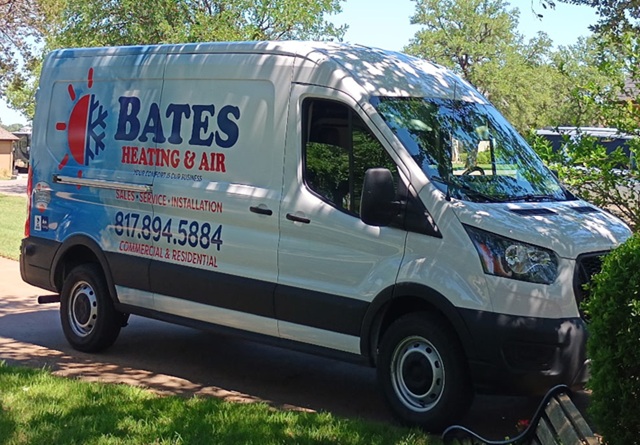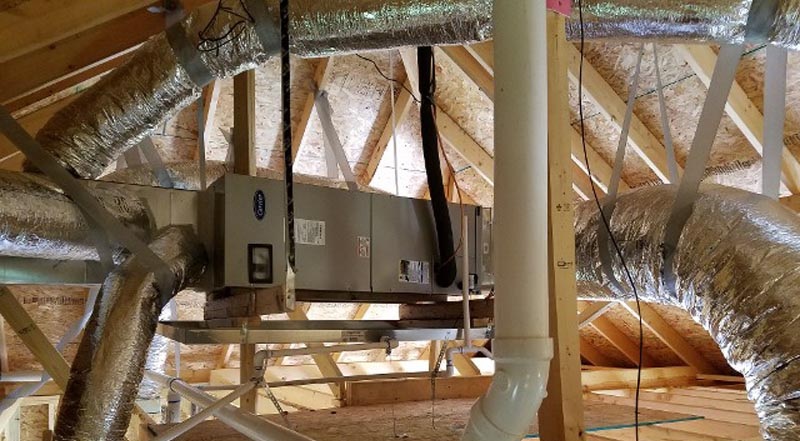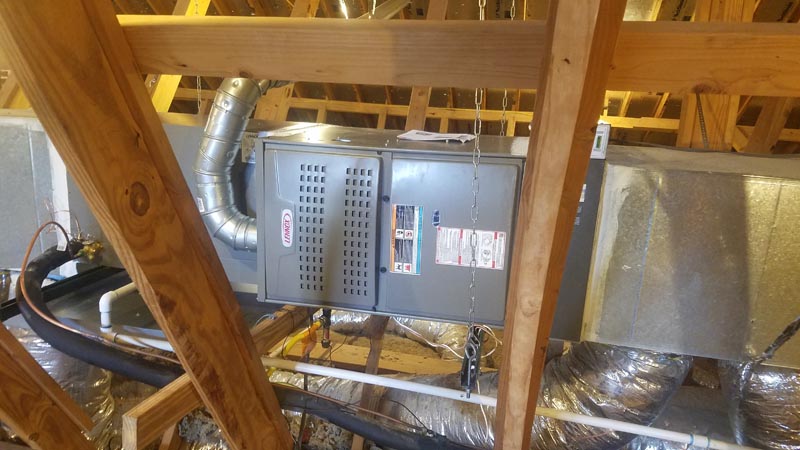





At Bates Air Conditioning Service: We are an experienced and reliable Trane certified air conditioning provider. If you have any HVAC questions or need an free estimate, we are here to help and we are local! We live and work in this area.




Ensure your thermostat settings are correct. Set the temperature control selector below the current room temperature, and make sure the system switch is in the "COOL" or "AUTO" position.
Set the fan switch to "ON" for continuous airflow or "AUTO" for operation only when the air conditioner is running.
To test if the air conditioner turns on, lower the thermostat to its lowest temperature setting. If airflow from your registers is weak, inspect the air filter. A clogged filter can restrict airflow. Also, ensure all registers are open and unobstructed.
Check the power disconnect switches for both the indoor and outdoor units. Additionally, verify the fuse or breaker at the electrical panel for both units.
If the issue continues, please contact us for assistance.




When the outside unit of an AC system loses power, several factors could be at play. Firstly, a tripped circuit breaker could be the culprit, especially if there's been a recent power surge or overload. Check your electrical panel to see if this might be the issue.
Another common cause is a blown fuse. Fuses can blow due to age or an electrical fault, and replacing them might resolve the problem. Additionally, a faulty capacitor, which is responsible for starting the compressor and fans, could also lead to power loss to the unit.
Wiring issues, such as a disconnected or damaged wire, could interfere with the power supply. It's always beneficial to have an HVAC technician inspect for any worn or frayed wires that might not be obvious at first glance.
Consider any localized outages; perhaps the unit itself has lost power due to an issue like a faulty thermostat connection or a problem with the unit's power supply.
Regular maintenance can prevent many of these issues, ensuring your AC functions smoothly when needed most.
Clogged air filters might seem like a minor inconvenience, but they are one of the most frequent causes of air conditioning woes. These unsung heroes of your HVAC system are tasked with a critical job: trapping dust, dirt, pet hair, and other airborne debris to prevent them from infiltrating your unit. While they excel at keeping these contaminants at bay, their effectiveness comes at a cost. Over time, the very particles they’re designed to block accumulate, transforming a once-efficient filter into a choked barrier that hampers your system’s performance.
When an air filter becomes clogged, it restricts the airflow that your air conditioning unit relies on to operate effectively. Imagine trying to breathe through a straw clogged with debris—it’s a struggle, right? Your AC faces a similar challenge. With reduced airflow, the system has to work harder to pull in air, putting unnecessary strain on its components. This inefficiency doesn’t just waste energy; it also leads to noticeably warmer air circulating through your home. Instead of the cool, refreshing breeze you expect, you’re left with lackluster performance that fails to combat the heat.
The problems don’t stop there. Restricted airflow can wreak havoc on your AC’s evaporator coils, the part of the system responsible for absorbing heat from the air. When airflow is insufficient, these coils can become too cold and freeze over, forming a layer of ice that further obstructs the cooling process. This creates a vicious cycle: the unit works harder to compensate, energy bills climb, and your home still doesn’t reach the desired temperature. Left unchecked, this strain could even shorten the lifespan of your air conditioner, leading to costly repairs or premature replacement.
Fortunately, this is one air conditioning issue that doesn’t require a complex solution or an expensive service call. In most cases, swapping out the clogged filter for a fresh one is all it takes to restore your system to peak performance. It’s a straightforward task that homeowners can typically handle themselves—no technical expertise required. Head to your local hardware store, pick up a filter that matches your unit’s specifications, and follow the simple instructions in your AC’s manual to replace it. Within minutes, you’ll likely notice improved airflow and cooler air flowing through your vents.
Beyond solving immediate problems, a new filter can prevent future headaches. It ensures that your system operates efficiently, reduces wear and tear on critical components, and keeps those pesky frozen coils at bay. Plus, it’s a small investment that can lower your energy bills by allowing your AC to run smoothly without overexerting itself.
The key to avoiding the pitfalls of clogged air filters lies in regular maintenance. Most air conditioning experts recommend replacing your filter every one to three months, though the exact timeline depends on factors like your system’s model, usage patterns, and environmental conditions. Homes with pets, heavy dust, or allergy sufferers might need more frequent changes, while a single occupant in a cleaner environment might stretch it closer to the three-month mark. To be certain, flip open your unit’s user manual—it’ll provide the manufacturer’s specific guidance tailored to your system.
Sticking to a consistent filter replacement schedule does more than just prevent breakdowns. It optimizes your AC’s cooling capacity, ensuring your home stays comfortable even during the hottest months. Clean filters also improve indoor air quality by effectively capturing pollutants, which is especially beneficial for those with respiratory issues or allergies. By making this small task a routine part of your home maintenance, you’re not only protecting your air conditioner but also enhancing your living environment.
Clogged air filters may be a common issue, but their impact on your air conditioning system is far from trivial. From reduced efficiency and frozen coils to higher energy costs, the consequences of neglecting this simple component can add up quickly. Thankfully, the remedy is as easy as it is effective: regular filter replacements. By staying proactive and keeping your filters clean, you’ll enjoy a cooler home, a healthier system, and the peace of mind that comes with knowing you’ve sidestepped a preventable problem. So, the next time your AC seems off, don’t overlook the filter—it might just be the quick fix you need.
